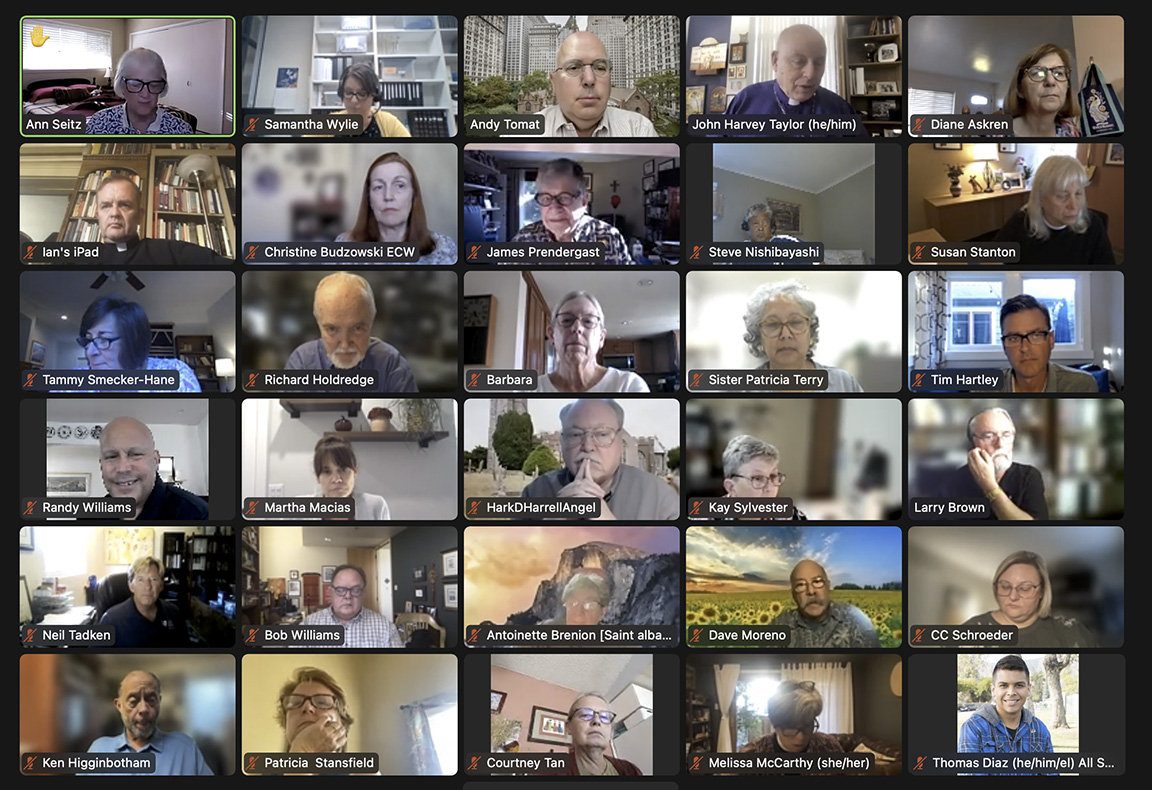
Members of Diocesan Council meet via Zoom on Oct. 14 to consider the proposed 2024 diocesan budget to be voted on by Diocesan Convention, meeting Nov. 10 – 11.
[The Episcopal News] The 2024 proposed budget to be submitted to the Nov. 10 – 11 Diocesan Convention, along with the new assessment process for parish contributions to the Mission Share Fund, was the main business of the Oct. 14 meeting of Diocesan Council, held via Zoom.
The council also heard reports from the Bishop’s Commission on Gospel Justice, focusing on its mental health projects, and from the diocesan coordinator for the United Thank Offering.
Bishop Diocesan John Harvey Taylor began the session with a prayer for peace; a subject he touched on again toward the end of the meeting in remarks concerning the volatile situation in Israel and Palestine.
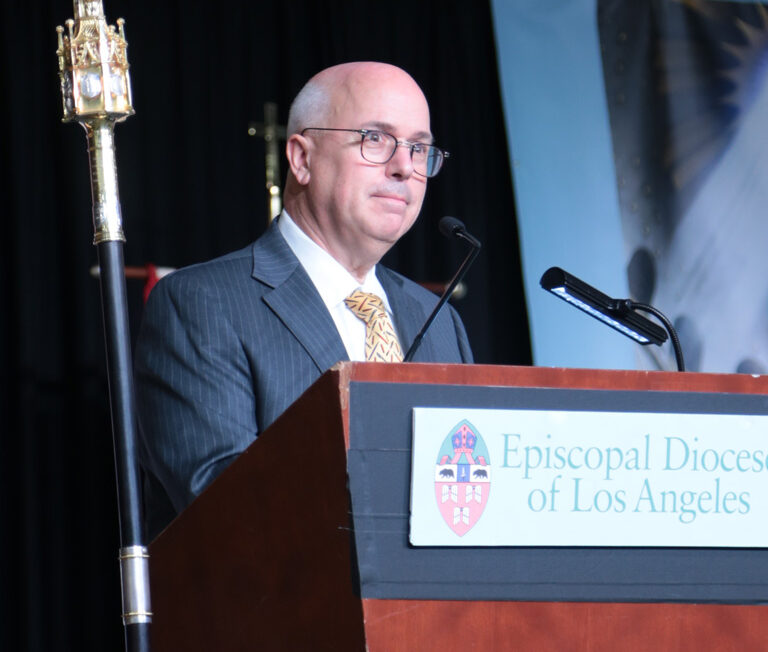
Canon Andy Tomat, treasurer of the diocese, is pictured at the 2022 meeting of Diocesan Convention. Photo: Janet Kawamoto
Assessments and the 2024 budget
The move to the assessment process, as announced at the 2022 convention, will be fair and equitable as parishes of all sizes work out how they will fulfill their 12% commitment to the Mission Share Fund, according to Canon Andy Tomat, volunteer treasurer of the diocese.
Diocesan Council voted unanimously to approve both the move to assessments beginning Jan. 1, 2024 and the related 2024 proposed budget for referral to the upcoming Diocesan Convention.
The 2024 budget is based on all parishes of the diocese paying an assessment of 12% of their 2022 normal operating income, as reflected in their parochial reports. All mission congregations pay a 10% MSF assessment, plus about 5% in other assessments; all missions currently are in compliance. The move to mandatory parish assessments – a change from the recent practice of viewing it as a voluntary pledge – is authorized by diocesan constitution and canons and has always been a part of Episcopal Church polity. Most other dioceses have mandatory assessments that are far higher, but their assessment review processes assist parishes in special circumstances.
To assist with the transition from pledges to assessments, Taylor has appointed an Assessment Review Committee (ARC) chaired by the Rev. Rachel Nyback, rector of St. Cross Church, Hermosa Beach. Tomat, reporting for the committee, said that it has put in place what its members believe is a fair process for parishes that have not yet reached the 12% level. (See related story here.)
The committee, Tomat explained on Nyback’s behalf, considers parishes to be in three categories:
- Those giving at the 12% level or higher (or planning to do so in 2024)
- Those that can afford 12% but choose to use their money elsewhere
- Those that do not have enough funds to make ends meet.
“We continue to give thanks and appreciation to the majority of parishes, and missions who are in category one,” said Tomat. “In category two, the ARC flat-out expects the 12% to be paid in 2024.” The ARC process will focus on the category three parishes to help them come into compliance or be granted a waiver. Waiver applications, Tomat said, will require relevant documentation from the parish of their financial situation, stewardship practices, and spiritual health, to be submitted via an online portal. The ARC will work alongside parishes in this category to help them reach fiscal sustainability. There also will be a procedure for dealing with any congregation that ignores the direction of convention and the bishop and refuses to pay its assessment.
The Very Rev. Canon Ian Davies, also a committee member, said its approach has been pastoral as well as fiduciary, based on two passages from St. Paul’s epistles:
Let love be genuine. Abhor what is evil; hold fast to what is good. Love one another with brotherly affection. Outdo one another in showing honor. Do not be slothful in zeal. Be fervent in spirit. Serve the Lord; rejoice in hope; be patient in tribulation; be constant in prayer. Contribute to the needs of the saints and seek to show hospitality. Rejoice with those who rejoice; weep with those who weep. Live in harmony with one another.
— Romans 12:9-16
My friends, bear one another’s burdens, and in this way you will fulfill the law of Christ.
— Galatians 6:2
Tomat then turned to the 2024 draft budget as prepared by the Joint Budget Committee, which includes the Rev. Patricia Stansfield, the Rev. Tim Hartley and Dave Moreno of Diocesan Council, and Corporation of the Diocese directors Charlotte Borst, Arthur Gregorian and Mary Pierson; assisted by the Rev. Susan Stanton, diocesan CFO, and Martha Macias, diocesan controller.
“2024 will be our first fair and balanced budget,” Tomat said. “In the past, all missions and many parishes gave their fair share to the Mission Share Fund, while others, through necessity or choice, paid less. This led to a combination of program budgets having to be balanced by aspirational funding expectations, continued deferment of vicar and staff pay increases and draining our remaining cash reserves when things didn’t pan out as planned.
“Historically, this voluntary pledge model used shame as a way to motivate people to pay their fair share, which unfortunately resulted in a lumping together of those who were truly struggling with those who elected to prioritize their local needs. The move to a mandatory assessment process finally allows us to move to a more equitable model.”
Tomat said that he, the bishop and the canon to the ordinary have secured commitments from six of the diocese’s largest and best-resourced parishes to contribute the full 12%; a seventh is in leadership transition, but has historically paid its full share.
“Rather than shaming those who are struggling,” Tomat continued, “this budget sets aside two and a half percent or $127,000 to fund assessment waivers for those struggling parishes, which, when combined with a new assessment review committee process … will offer a helping hand to those parishes most impacted by this transition.
With those provisos, he said, the MSF portion of the total $11 million budget, to be approved by convention, will total $5.8 million, including $4.95M from parish and mission assessments.
The proposed budget will support several key goals established by the bishop:
- Funding for New Community ministries, serving congregations of Asian Pacific Islander, African, Chinese, Korean, and Native American descent
- Resolving longstanding pay inequities for mission vicars and diocesan staff
- Staffing new housing and development offices
- Staffing a new chaplaincy to retired clergy; the Rev. Canon Susan Russell will fill this role in addition to her work as canon for engagement across difference
- Support for the work of the Rev. Jana Milhon-Martin, director of the Center for Lay Chaplaincy, on a part-time basis while the program seeks new funding sources.
The 2024 budget will be presented in summary form at the deanery meetings and in the convention booklet. The full joint budget committee transmittal memo and budget line-item detail soon will be available in the budget section of the 2024 convention website.
Bishop Taylor thanked Tomat, the joint budget committee, the Corporation of the Diocese, and the diocesan finance office staff “who have been over the last year and a half determined to bring us to a point where we do as almost all of the Episcopal Church does – and that’s to construe a canonical minimum Mission Share Fund gift as an assessment and a requirement rather than a pledge. It’s not because any of those who worked on this underrate the difficulty that missions and parishes are having in these difficult times for the church. It is because we’re hopeful and optimistic about The Episcopal Church in the 21st century in a secularizing time, in a time when people are becoming more isolated and lonely.”
The assessment is necessary, Taylor said, so the diocese can support its congregations, especially missions, in their work.
“We know it’s hard for those of you in parochial leadership,” he said. “But we’re deeply grateful for the way the largest churches have come alongside, and others are rising to the challenge. And for those churches that find that structurally they can’t do it, we reckon that is an invitation from the Holy Spirit to find ways to help them be abundant in worship, ministry and mission by structuring themselves differently, lifting up lay people to provide teaching and preaching and sometimes even preside on a Sunday morning — all the different things that can happen and that are happening elsewhere in The Episcopal Church that enable churches to function more economically while continuing to serve their neighborhoods.”
Finally, reporting on current 2023 finances, Tomat said that MSF revenues were down a bit in August. “And if this rate continues, we could fall up to $150,000 to $200,000 short of our $4.55 million goal for the year,” he said. “So it’s critical we get the message out to parishes to maintain their contributions to year end.” Tomat also noted that historically congregations have caught up at the end of the year. Expenses, he added, are in line with expectations for this time of year, except for the Seeds of Hope program, which is running a deficit because it has lost grant income on which it depended in the past.
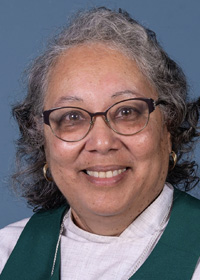
Canon Patricia Sarah Terry
Gospel Justice and Community Care
Sister Patricia Sarah Terry, chair, reported that the Bishop’s Commission on Gospel Justice and Community Care is currently focused on mental health first aid, assisted by the Rev. David Gartner of The Episcopal Church’s task force on mental health, which is developing curricula for clergy, she said.
The diocesan commission, through the work of the Rev. Brian Tucker, is supplying mental health first aid training “to treat mental health issues the same way we do physical problems,” said Terry; “that there is a first aid that can be provided that can at least give people hope for the moment that they’re not alone.”
Information about this training, as well as the new nationwide 988 emergency phone number (similar to 911, but for mental health support instead of a police response) will be available at the commission’s booth in the exhibit hall at Diocesan Convention. “It is much more caring to have someone who understands what the person is experiencing, what are the best ways to help them, and what possible resources there may be,” Terry said.
The commission, she said, also is working with the city of Los Angeles and the office of Mayor Karen Bass to learn more about their listening center work and mental health resources.
Standing Committee report
Diane Askren reported that during its most recent meeting the Standing Committee received notice of the removal of James Rollin Landry III as a priest of the church. (Taylor emphasized that Landry stepped down voluntarily from the priesthood for personal reasons, not for any kind of misconduct.) The Standing Committee also approved the sale of two non-sacred properties; assented to two loan repayment requests from congregations; and gave consent to the elections of the Rev. John T.W. Harmes as bishop diocesan of the Diocese of Arkansas and the Rev. Jeremiah Williams as bishop diocesan of the Diocese of Albany (New York).
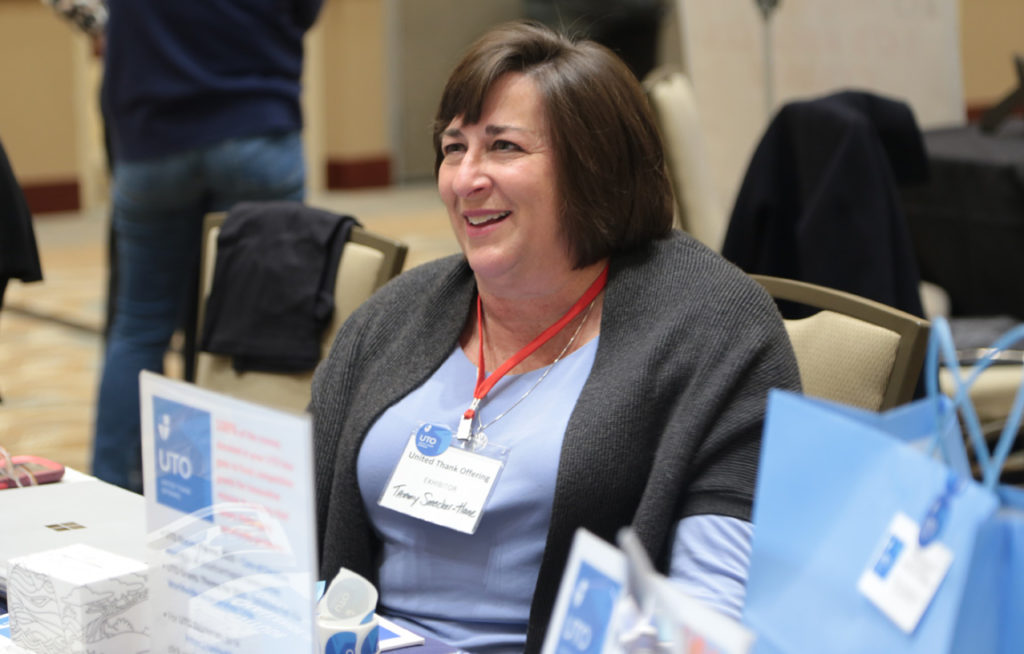
Tammy Smecker-Hane, United Thank Offering coordinator, is pictured at the 2022 meeting of Diocesan Convention. Photo: Janet Kawamoto
ECW, Daughters of the King and UTO report
Tammy Smecker-Hane, diocesan coordinator for the United Thank Offering, said she recently sent letters to all congregations of the diocese asking them to take part in the UTO ingathering, in which parishioners drop coins (or bills) into UTO’s blue mite boxes to express gratitude. That money is collected and combined with offerings from other dioceses, and the funds given back in grants to churches and other ministries throughout the world.
“In years past, something like 75% of all the [congregations in the diocese] actually had a yearly ingathering,” Smecker-Hane said, “but for the past two years that’s gone down to about 9%. So we really need to build up our participation.”
She noted that the downward trend in contributions was church-wide, and the UTO has had less money to distribute in grants, to the detriment of many ministries. Each diocese may submit one grant request, she explained.
“They could have given out 50% more grants [last year] if they just had the money,” she said. “The good ideas are there. The good grant proposals are there. It’s just the lack of funds.”
UTO Ingathering is traditionally in November, Smecker-Hane said, but congregations are welcome to give at any time. She will be at the UTO booth at Diocesan Convention, and will be available to help any congregation that would like to participate. In addition, she said, UTO boxes will be available on all tables on the convention floor.
“The theme of the grants this year will be “welcoming the stranger,” she said. “So the grants will focus on welcoming people with differences that cause isolation, either through culture, life experience, disability, mental health issues, etc., in new ways that are meaningful and necessary for the community; and to encourage truth telling, acknowledging historic trauma and establishing a pathway toward healing.”
She encouraged congregations and ministries involved in such ministries to consider applying (through the diocese) for UTO grants next year. For assistance and information, contact Smecker-Hane at tsmecker@cox.net or visit the UTO booth at convention or the UTO website.
Christine Budzowski, president of the diocesan ECW, reported that the Daughters of the King will hold its first in-person assembly since the beginning of the Covid pandemic on Saturday, Nov. 4 at Emmanuel Church, Fullerton. All are invited to attend; for information visit the website.
General Convention and Diocesan Convention
Thomas Diaz, alternate deputy to the 2024 General Convention, said that the deputation met on Oct. 14 with their counterparts in other California dioceses in person at Church Divinity School of the Pacific (CDSP) and via Zoom. They heard a report from Michael Barlow, general convention executive officer for The Episcopal Church; a presentation on denominational trends; legislative discussions on immigration reform, prayer book revision, Title IV disciplinary canons, and climate. “Our day concluded with a really robust and full conversation with President of the House of Deputies Julia Harris,” he said.
Canon Steven Nishibayashi, secretary of convention for the diocese, reported that there were, as of Oct. 19, 22 days until the 2023 meeting, to be held Nov. 10 – 11 at the Riverside Convention Center. He referred council members to the “comprehensive summary” of convention news in the Episcopal News Update and on the convention website.
Canon to the Ordinary Melissa McCarthy reported that St. Paul’s Commons has been awarded a security grant and she is working with other staff members to make the building safer for staff and visitors.
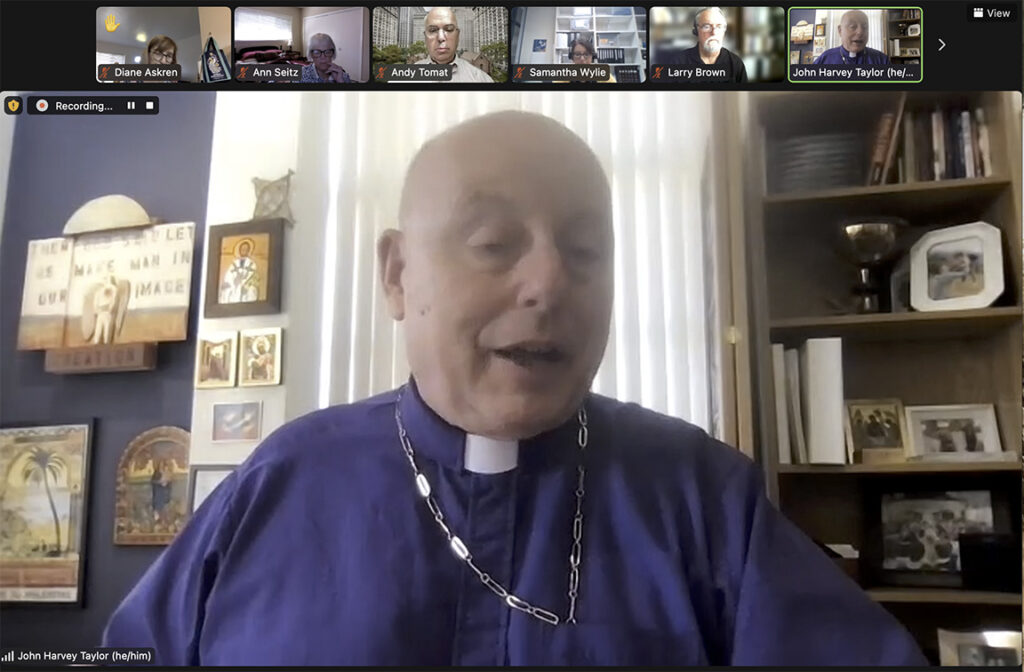
Bishop John Harvey Taylor addresses Diocesan Council via Zoom at its October 2023 meeting.
Bishop’s report
“My report will be confined to just four brief reflections on events in Israel and Palestine,” said Bishop Taylor, who asked for a show of hands of council members and guests who have visited the Holy Lands.
“The maelstrom of current events is not a good time for political and policy arguments about Israel and Palestine,” he said, noting the huge loss of life there that has touched people he counts as friends and colleagues. “So the energy to force ourselves to steel our tongues and listen and learn and try to resist the tendency to fall prey to what some call confirmation bias.”
We may never know, he said, who was responsible for the attack on the Al Ahli Arab Hospital in Gaza (an institution of the Episcopal Diocese of Jerusalem) that claimed many lives. “But perhaps not to be too distracted by who did what to whom, and understand that it’s a pernicious and deeply rooted conflict between two sides who can point back to moments of original sin almost ad infinitum. What the situation needs from us as a measure of humility.”
(According to a U.S. government report quoted in the New York Times, the explosive weapon that hit the hospital compound does not appear to be of Israeli origin, and might have been a missile from Palestinian Islamic Jihad, which has ties to Hamas.)
“Second, pray and pray and pray,” Taylor continued. “The Episcopal News Update [of Oct. 23] has a prayer and a litany that I borrowed from the Rev. Dan Justin at St. Michael and All Angels in Studio City that he had borrowed that morning from another source. Print them out. Keep it on your phone. Say the litany. Say the prayer.”
Taylor said that the Los Angeles Council of Religious Leaders is working on a statement that opposes the taking of hostages and attacks on non-combatants. “Humanity demands that non-combatants be protected to the extent humanly possible, not held hostage nor used as shields nor ever attacked purposely for any reason. … Perhaps that’s something we can agree on,” he said.
“And fourth, let’s be as generous as we can to the American Friends of the Episcopal Diocese of Jerusalem. … They have raised since the attack over $300,000. But they’re going to need more. They’re not political, they’re not partisan. All we know is that refugees huddled in the courtyard or in the open spaces near the hospital were injured or killed as a consequence of the bomb or the missile that fell. And they’re going to need to care for these people and repair the damage so they can continue their ministry. So let us let us give of our abundance to the extent that we can.”
Diocesan Council will meet next on Thursday, Dec. 14 at 4 p.m. via Zoom.
